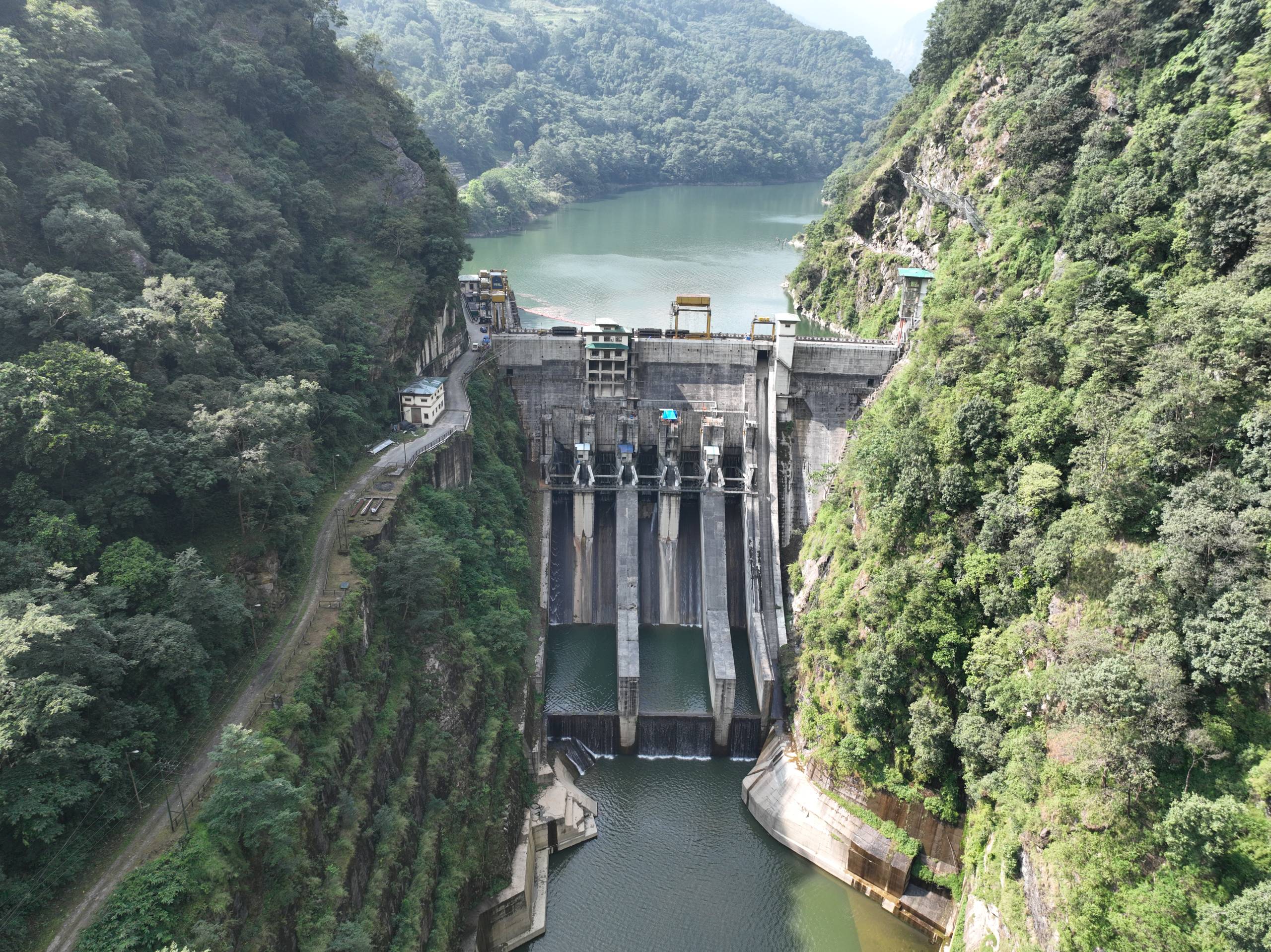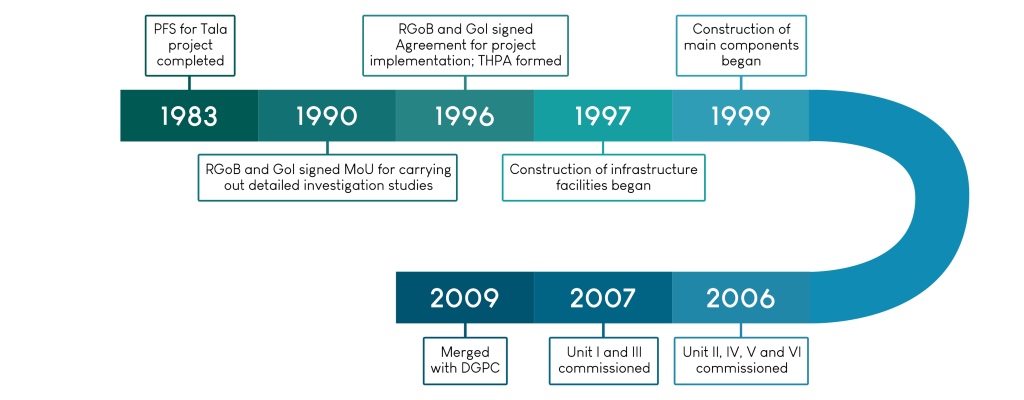Project scheme : Run-of-the-river
Project commission : 2006 – 2007
Installed capacity : 1,020 MW
Tala hydropower plant (THP), located downstream of Chhukha hydropower plant, is one of the power plants of DGPC. With the completion of field investigations in March 1993, the detailed project report was prepared in October 1993. Tala Hydroelectric Project Authority was constituted for the construction, operation, and maintenance of the project. The project components stretch for approximately 100 km from the dam at Wangkha to the TRT outfall at Tabji.
Operation and Maintenance
Despite the initial teething problems, a few of which continue to this day, THP’s overall performance has remained relatively good since its commissioning. The electricity generated by THP is sold to Bhutan Power Corporation Limited for domestic consumption, and surplus energy is exported to India through PTC India Limited. THP provides 15% of the annual energy production as royalty energy to RGoB.
To supplement the power generation during the lean months, Tsibjalumchhu stream was diverted to Wangkha dam on June 30, 2014. This diversion scheme provides annual additional generation of 93 MU. DGPC’s design and engineering team executed the project, including the feasibility studies, design and engineering.
Renovation and Modernisation
THP had several teething problems since commissioning, inherited from the THPA. A few others surfaced over the first few years of operation under DGPC. While most of the issues were resolved after the project’s takeover by DGPC, a few remaining issues are being addressed through consistent efforts in consultation with various renowned agencies and consultancy firms.
Some of the major teething issues that were addressed are – the replacement of original cast runners with forged fabricated runners and hard-coating to withstand the pitting and abrasion by sediments, water leak from surge shaft bottom, modification of surge shaft gates hoisting mechanism, the rectification of grout plugs of pressure shafts, 400 kV XLPE cable termination, GIS, bypass pipes of MIV, UGPH ventilation system, HRT concrete lining peeling, water leak from Mirchingchhu adit, and more.
The computerised controlled system (CCS) was non-operational since the plant’s commissioning despite the continuous efforts put in by the OEM and THP to rectify it. Now, a modern SCADA system is considered to replace the CCS and will be completed in 2025. Along with the SCADA, the governing system of the turbine will be upgraded from a hydro-mechanical to a servo-based governor given the inherent problem with the existing system. Because of the perennial problem with the existing nozzle injector system in all six units since commissioning, these injector systems are being replaced phase-wise with one set already installed in one of the units in 2023.
Socio-Economic Benefits and Sustainability
THP was a significant contributor to the Bhutanese economy. Upon commissioning, the electricity sector’s GDP contribution to the country increased from about 13% to about 20%. The availability of more power spurred the growth of several domestic industries.
During the construction phase, THP helped the communities in the vicinity through infrastructural facilities such as schools, health units, communication, road connectivity, and trading. One such community is Gedu town which went through a dramatic transformation from an almost unpopulated area. Further, after the project’s commissioning, the THPA office complex and residential quarters in Gedu were used to set up a business college.
With the construction of Rinchentse lhakhang, the annual mani drup and tshechu are being conducted for the well-being of the employees and all sentient beings, and the efficient functioning of the plant.
THP continues to support the Druk Green “Being Green” initiative through regular landscaping and plantation activities. The plant is conscious of the need to maintain a sense of harmony with the community and environment. Further, THP sensitises the social and environmental issues that confront the hydropower sector, thereby ensuring a healthy and sustainable environment.
Contact
- Rinchentse, Tala
- +975 77182006



